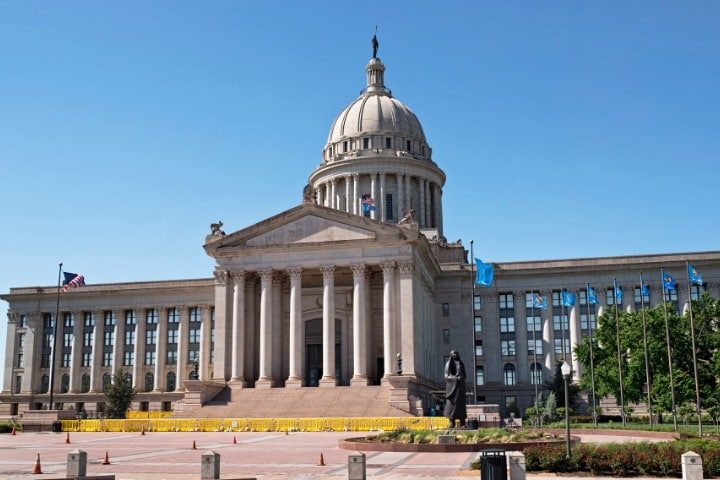
Pro-lifers were understandably elated at the reversal of Roe v. Wade by the U.S. Supreme Court with its Dobbs decision last month, but don’t expect supporters of abortion to concede the issue in the states, where the court’s decision returned it. Oklahoma’s pro-life attorney general, John O’Connor, vowed on Tuesday to combat the effort of pro-abortionists in Oklahoma to use state courts to reinstate legalized abortion there.
After the U.S. Supreme Court ruling in Dobbs, Oklahoma’s “trigger law” went into effect, reinstating the 1910 statute that made the performance of an abortion a felony. The Oklahoma Call for Reproductive Justice has filed a petition with the Oklahoma Supreme Court, saying, “The revival of the 1910 Ban and the enactment of the 2022 Ban are the products of a decades-long mission to force pregnant Oklahomans to give birth against their will and to make Petitioners (abortion providers) into criminals for providing and supporting essential health care.” The petition continued, “Now that Roe and Casey have been overturned, the question for this court in this case, and other cases challenging the overlapping abortion bans enacted by the Legislature, is whether the broad protection for individual liberty in the Oklahoma Constitution bars the state from running roughshod over the choices of Oklahomans who are pregnant. It does.”
Attorney General O’Connor, however, is not buying their argument. In his response he said, “Simply put, there is no fundamental right in the Oklahoma Constitution to kill a whole, separate, unique, and living human being in the womb. Oklahoma’s longstanding criminal law protecting the unborn is rational, as is the similar law set to take effect in August.” O’Connor is referring to another law that Oklahoma’s Republican-dominated Legislature passed during this past session, which will go into effect August 27 and will increase the penalties for performing an abortion from two to five years in prison to up to 10 years, plus a fine of $100,000.
The only exception under the statute set to go into effect in August is to save the life of the mother. While the new law proposes to punish those who perform abortions, it does not penalize the mother.
O’Connor argued, “Oklahomans have spoken with one voice” through their elected representatives “throughout the history of our State: Abortion, our citizens clearly believe, should be illegal.”
Turning to state courts is not the only tactic that abortion providers are pursuing in an effort to keep abortion legal in states like Oklahoma that have enacted tough laws to protect the lives of unborn children. In their search to circumvent the sovereignty of the states on this issue, some have even demanded that federal lands be opened up to abortion mills in those states where abortion is restricted. Others have eyed Indian tribal lands as potential locations for abortion providers in those states. Fortunately, that does not seem likely in Oklahoma, at least for now.
While it is true that many tribal leaders are Democrats, even in heavily Republican Oklahoma, those leaders have to consider the wishes of tribal members. As Stacy Leeds, a Cherokee Nation of Oklahoma citizen and a law professor, recently explained, “Politically, (Indian) people are all over the place. You know, it’s a large leap to just automatically presume that everybody (among Native Americans) would want this.”
Louisiana is another state where pro-abortion advocates have turned to local judges to thwart the will of the state’s law-making branch, the Legislature. On Tuesday, Judge Donald Johnson issued a temporary halt to that state’s very restrictive abortion law, and a hearing has been set for Monday of next week. As in Oklahoma, the state’s attorney general, Jeff Landry, opposes the effort to use the courts to overturn the state law against abortion.
“To have the judiciary create a legal circus is disappointing. The rule of law must be followed,” Landry vowed, “and I will not rest until it is. Unfortunately, we will have to wait a little bit longer for that to happen.”
Joanna Wright, a lawyer for the abortion clinic that brought the suit prompting the temporary halt, said, “We look forward to arguing for a preliminary injunction before Judge Johnson next Monday and, in the meantime, we take solace in the fact that crucial healthcare for women has been restored in the state of Louisiana.”
As an aside, noting that Wright called abortion “crucial healthcare for women,” it appears that leftist ideology is at odds with itself at times. In the Oklahoma lawsuit, the abortion providers, instead of referring to “women,” refer to “pregnant Oklahomans” and “Oklahomans who are pregnant.” Perhaps the Oklahoma plaintiffs do not want to offend those who contend that men can now get pregnant.
Oklahoma’s A.G. John O’Connor countered the abortion provider petition’s arguments, noting that they were “dismantled” by the United States Supreme Court, that abortion was illegal even prior to statehood in the various tribal governments, and that just three years after Oklahoma became a state in 1907, a law was passed in 1910 specifically outlawing abortion.
“There is an enormous logical leap between saying that Oklahoma’s founders intended Oklahomans to have robust and inalienable individual liberties — even stronger than Americans more broadly — and declaring that these liberties somehow include a fundamental right to kill an unborn human being, especially when those same framers were perfectly comfortable with criminalizing abortion to protect the unborn.”
O’Connor’s argument seems to be historically well-grounded. The president of the 1906 Constitutional Convention was William H. Murray, who was the chief attorney for the Chickasaw Indian Tribe, and then was speaker of the House of Representatives of the Oklahoma Legislature when Oklahoma became a state and enacted the law making the performance of an abortion a felony. It is difficult to argue that the framers of the state’s constitution intended abortion to be protected as a “liberty,” but were unaware of that desire four years later, when they criminalized it.
Yet, that is typical left-wing progressive logic on many issues, not just abortion. For example, progressives contend that the framers of the 14th Amendment in the 1860s intended to legalize same-sex marriage in all states! Of course that was not their intent, but had it been, it would never have passed Congress.
One can expect all sorts of efforts by those who support abortion on demand to circumvent the core principle of the U.S. Supreme Court’s Dobbs ruling — that the regulation of abortion is among those powers reserved to the states under the U.S. Constitution. And that does not mean that state judges should be able to substitute their opinions on the issue for that of their state’s constitution and state legislature, as has so often been done on the federal level.
Those who want to protect the lives of unborn children must be prepared to fight the convoluted arguments of abortion-on-demand advocates at the state level, both in the legislative chambers and in their court systems.



